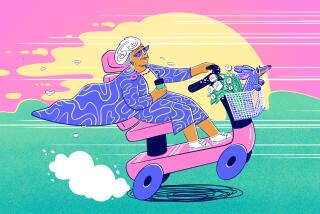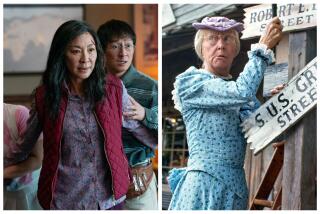Age Bias May Limit Cancer Therapy for Older Women
A subtle and perhaps unconscious age bias among doctors may be depriving thousands of older women of aggressive therapy for breast cancer--perhaps needlessly shortening their lives--according to a new UCLA study.
The study, which examined breast cancer treatment given to 374 women at seven major Southern California hospitals, found women 70 and older received inappropriate treatment for their breast cancers four times as often as women 50 to 69. Nearly one of five of the older women received incorrect therapy.
In all, the older women received appropriate care 83% of the time while the younger group was correctly treated in 95.6% of all cases. Older women, said a member of the UCLA team, often did not have modern breast-saving surgery--such as the so-called lumpectomy--and their treatment less often included complete exploration of the lymph nodes in their armpits to determine whether their cancers had spread.
The conclusions focused on women with two of the most treatable types of breast cancer.
“We conclude that physicians may manage patients with this highly treatable (if found early) disease according to (chronological age alone) without regard for physiological condition,” the UCLA team said, “and that this age bias may result in a less favorable prognosis than could be achieved using currently recommended therapy.”
The finding allowed for such variables as the greater prevalence of serious health problems other than cancer in women over 70 and the possibility that cancer in the older women may have spread more by the time it was detected.
In the research, older women free of cancer and other serious disease were matched against members of the younger group in similar health.
The age-related difference in breast cancer therapy was seen beginning by age 65, but statistically significant disparities were not clear until age 70, the research team said.
Breast cancer was the only type studied in the UCLA investigation. Researchers suggested similar studies to identify possible age bias in other types of cancer.
According to American Cancer Society estimates, 48.5% of breast cancers diagnosed each year are in women between 50 and 69, with an additional 19.2% in women between 70 and 79. The society said 130,000 new cases are projected for 1987, of which 63,050 are projected to be in women 50 to 69 and 24,960 in women 70 to 79. After age 80, incidence declines markedly.
Standardization Unique
The researchers, from UCLA and the Sepulveda Veterans Administration Hospital, said the standardization of the two groups of women studied--stripping away factors that might medically justify less vigorous intervention with some older patients--was a unique feature of the new research. A report appears today in the Journal of the American Medical Assn.
The 374 cases studied were selected from among those treated at the seven hospitals, which Dr. Sheldon Greenfield, who headed the research team, declined to name because of confidentiality agreements. However, Greenfield confirmed that the group includes health centers in Santa Barbara, the San Fernando Valley, the Westside and the South Bay.
Greenfield said there was little variation among the hospitals in terms of the differences in treatment between the two age groups. He and Dr. Patricia Ganz, another researcher, agreed that the treatment decisions were made by individual physicians.
The women’s health insurance status--including their reliance on Medicare and Medi-Cal--did not influence the choices.
‘Doctor-Related Thing’
“It was a rather universal thing,” Greenfield said. “We uncovered something that’s not very much related to the hospital. It’s more of a doctor-related thing. I prefer to think it’s something done unconsciously.”
What apparently occurs, the research team said, is that physicians conclude that an older women may not be as concerned as a younger one with saving her breasts. Also, because of her age, doctors apparently do not order removal and study of lymph nodes to determine the extent of her disease in the belief that she will live only a few more years anyway.
Dr. Arthur Holleb, the American Cancer Society’s senior vice president for medical affairs, agreed an unintentional age bias probably does color the therapeutic decisions of physicians.
“I suspect it’s probably true,” he said, “because most of us taking care of patients try to be as easy as possible on the older folks. We probably do have a tendency to do a little bit less than we normally would for a younger patient.
“I do think it needs to be rethought . . . to be sure that adequate therapy is being performed for all patients.”
Good Chance of Recovery
Greenfield said that an otherwise healthy 70-year-old whose breast cancer is detected early can expect as good a recovery as a younger women. A statistically average 70-year-old women could expect to live another seven years, according to current American longevity rates.
Many older women, Ganz said, have complex physical problems that may justify a decision not to treat their breast cancers aggressively because they will survive only a few months no matter what is done.
Still other older women may choose to refuse definitive treatment even if it is available--for reasons that are no one’s business but their own, she said.
But many older women, Ganz said, hope for intensive therapy and are actively concerned about salvaging the affected breast.
Ganz, a tumor specialist, said a striking finding was that older women often simply were not offered the choice of a combination of conservative surgery, in which only a small amount of breast tissue is removed, and X-ray therapy to destroy any remaining cancer cells. The technique is familiarly known as the lumpectomy.
Cancer May Cause Their Death
Because the radiation therapy requires repeated outpatient sessions at a hospital or doctor’s office, Ganz said, older women may not have the opportunity to choose modern treatment because they face problems finding transportation.
“Other studies have shown that older patients with breast cancer survive just as well as younger patients,” Ganz said. “For many (older women), cancer will be the cause of their deaths if they don’t get definitive treatment.
“A lot of doctors may assume that an older patient may not care about conserving her breasts, while many older patients feel they have lived with the breast all of their lives and they don’t want to lose it.
“It’s a common misconception that an older woman would not want something a younger woman would. Older women deserve at least an opportunity to discuss that and choose.”
Other Study Concurs
The UCLA study was not the first to observe age-related differences in cancer treatment.
A New Mexico study published last year, for instance, concluded that age influenced treatment selection in a variety of cancers. But that study suggested that the presence of other disease may be influential in such decisions.
The new research, however, focused primarily on women with breast cancers classified as among the least serious and most treatable types--called Stage I and Stage II.
The UCLA team also developed a standardized way to assess the seriousness of other health problems and the influence of overall health on breast cancer treatment in women of all ages.
Dr. Laurence Rubenstein, a gerontologist who helped evaluate the UCLA study but was not a member of the research team, said the new findings are important because they may dispel erroneous assumptions among physicians.
‘Written Off Older People’
“A lot of (doctors) may have written off older people,” he said.
There may be an unconscious judgment, Rubenstein said, that older patients are “sicker and can’t tolerate the intensity (of aggressive cancer treatment) and also because they don’t have as many years to live and so: ‘Why put them through it?’
“I don’t know the magnitude of the process, but I do know that older people don’t get the same intensity in many treatments that younger people do.
“ ‘Ageist’ may be an inflammatory term, but I think it’s probably an accurate sentiment.”
BREAST CANCER TREATMENT Percentage of women who received appropriate or in appropriate treatment according to UCLA researchers.
Age Appropriate Inappropriate 59-60 95.6 4.4 70+ 83.0 17.0 Total 90.1 9.9
Source: Journal of the American Medical Association






